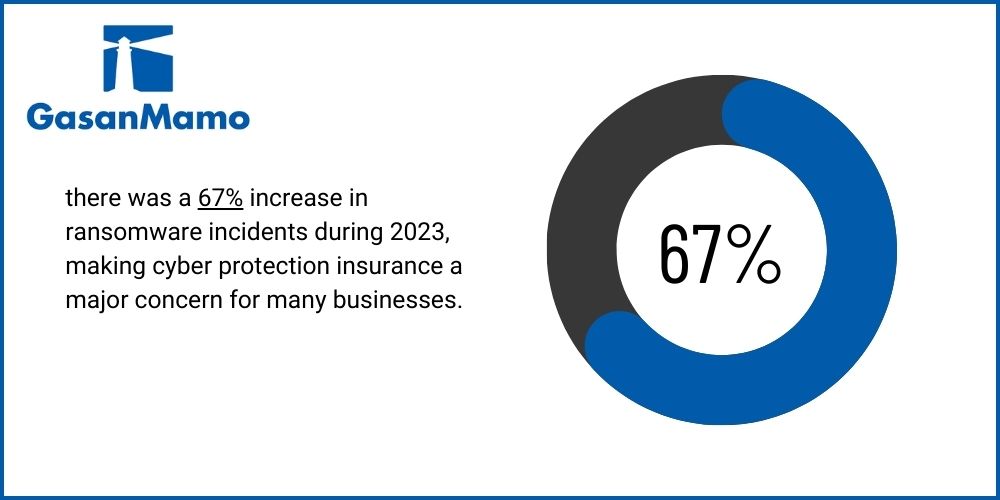Published on the 21st August 2024
What Is Business Insurance And Why Do You Need It?
Reading Time: 5 min read

Selecting the most appropriate business insurance policy for your business means taking a whole host of factors into consideration. You are the expert on your business, so you know that size, type, number of employees, physical assets and digital presence are all part of your decision making process.
According to the latest statistics, there are 2.8 billion euros in insurance claims per day throughout the European region. This statistic tells us that businesses across Europe require insurance protection due to unexpected incidents and damage, or even cyber attacks and data breaches.
This is why it is of the utmost importance for businesses of all sizes and in all industries to have access to the right information regarding their insurance policy options so they can make the best choice to suit their organisation.
It is also notable that there was a 67% increase in ransomware incidents during 2023, making cyber protection insurance a major concern for many businesses.

Contents
- What is business insurance?
- Why does your business need insurance protection?
- How to choose the right insurance.
What is business insurance?
Business insurance is a general term for a range of insurance policies that provide organisations with protection against financial loss, property or asset damage and coverage to support the safety and wellbeing of employees.
Typically, businesses can access specific types of insurance that align with their priorities and specific needs as an organisation. Some businesses may not need third-party insurance, as they don’t deal directly with customers or have physical premises. Others may require business vehicle insurance if they have a fleet of vehicles to look after.
Key points to consider when researching business insurance are:
- Common types of business insurance include business asset insurance, so that business assets are covered in the event of an unexpected incident or accident. Liability insurance is also another widespread policy, as this covers for third-party incidents or injuries.
- Businesses that have employees will need to invest in employee protection insurance to make sure that their workers are protected in case of an accident or injury at work.
- Business insurance covers a range of risks, such as property damage, legal liability or business interruption to keep businesses running if something untoward occurs.
- Every insurance provider will have policies available that cover different aspects of your business. It is helpful to research the market to make sure that you select the most appropriate insurance plans to suit your organisation’s individual requirements.
Why does your business need insurance protection?
Most countries and regions will require businesses to protect themselves against legal issues and to ensure their employees are safe in the workplace. Buying into business insurance helps you if your business faces a legal claim from a customer, partner or employee. Legal cases can create substantial costs, so preparation for any legal challenge is essential.
Building trust and credibility is part and parcel of business operations in our current commercial environment. Having a strong brand reputation online and in person allows your business to grow and evolve while keeping customer satisfaction levels high.
If customers know you safeguard their position, as well as that of your employees, through necessary insurance plans, then it is likely that they will trust your business more.
Employees like to know that their time at work is safe and their wellbeing is prioritised. Attracting and retaining the right talent helps your business flourish. Employee protection insurance can be part of an employee package that helps secure the best people to support your business moving forward.
Natural disasters do happen, usually at the most unexpected of moments. Crossing fingers and hoping your business will avoid any catastrophe may be unrealistic. Business insurance policies help to protect your business against adverse weather events that can occur on the brightest of days, so that you can claim for physical damage to your property.
How to choose the right insurance
There is no one route to selecting the most ideal insurance package for your organisation. However, the following steps are a guide to next steps:
- Review your business responsibilities
What are your objectives, goals and responsibilities? Considering physical and digital assets, employees, customers and legal requirements are all significant actions to take before making a business insurance plan choice.
- Decide on risk levels
Where are your business vulnerabilities? Are you liable to undergo legal action? Do you need to take out considerable protection for customers to ensure their safety on your premises? Confirming your level of risk as a business will help you decide on the specifics needed in a business insurance policy.
- Research providers
Take a good look at the business insurance market and see what is available. Do insurance providers have the right insurance policies that align with your business objectives and obligations? At GasanMamo, our expert team specialises in providing tailored insurance packages to fully support and protect your business.
In fact, GasanMamo can help you with all of your insurance needs. Our friendly team of specialists are always on hand to listen and provide expert advice around insurance choices.
We offer flexible packages which also look to the future of business protection, particularly with our cyber protection insurance policy that will help safeguard your business if you suffer a cyber attack or data breach. Read about how much does business insurance cost in our blog.
Discover more details about our extensive range of business insurance policies or get in touch with our team for a chat.
GasanMamo Insurance is authorised under the Insurance Business Act and regulated by the MFSA.